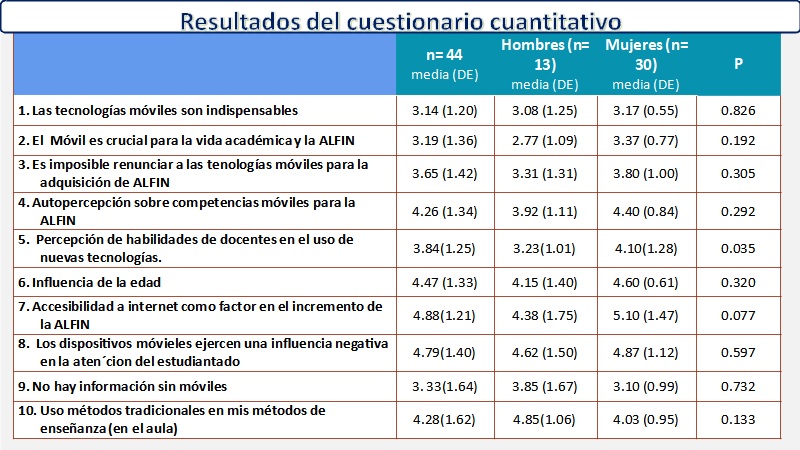Resumen
El objetivo de esta comunicación es analizar la relación entre ALFIN y el uso de dispositivos móviles en los procesos de enseñanza-aprendizaje del estudiantado universitario, concretamente, en maestros en práctica. Para ello, se seleccionó un grupo de estudiantes del último años del grado de Educación Primaria (N = 44), pertenecientes a la Universidad de Granada, para realizar un estudio cualitativo-descriptivo, basado en un focus group, utilizando las técnicas del thinking aloud y de las entrevistas semiestructuradas. De igual modo, y para completar el estudio, se administró un cuestionario cuantitativo breve de escala Likert. Tras el análisis de los datos obtenidos, se concluyó que hay un uso generalizado de los dispositivos móviles en los procesos de enseñanza-aprendizaje por parte de los estudiantes; que el incremento del uso de estos dispositivos parece relacionarse con una mayor distracción, debido a la utilización de éstos con fines no académicos; que la edad se constituye en un factor relevante y que el estudiantado demanda un incremento y actualización en la utilización de los dispositivos.
Abstract
The main focus of this paper is to analyze the relation between information literacy and the use of mobile devices in the process of learning-teaching in university students, specifically, teachers-in-training. For this purpose, a group of students belonging to the last semester of the Education Degree (N = 44) at the University of Granada was selected for a qualitative-descriptive study, based on a focus group, using the techniques of the thinking aloud and the semi-structured interviews; and for a brief quantitative questionnaire founded in a Likert-Scale. With these two procedures we tried to measure attitudes towards information literacy and the influence that mobile devices exert on its acquisition. Both results (qualitative and quantitative) were compared in order to check the consistency of the information offered by the students. After we analyzed the data, we conclude the following: 1. There is a generalized use of mobile devices in the process of learning-teaching. 2. The increase of these devices is related to a change of attitudes, which includes distraction, use of new technologies for other purposes (different to academics) and lack of critical outlook. 3. Age is a relevant factor for the development of attitudes and skills related to critical and independent thinking. 4. To a greater or a lesser extent, students demand the use of new technologies combined with a traditional methodology, on the basis of master classes, discussion groups, dialogue and interactions, and practicum.. 5. Data analysis identified gaps in the information literacy of teachers-in-training despite their constant access to information via mobile devices. Therefore, we propose that appropriate information literacy training is a key priority in teacher education. 6. Concerning the use of mobile technologies in the classroom, this research suggests both a positive impact and also some disadvantages.

